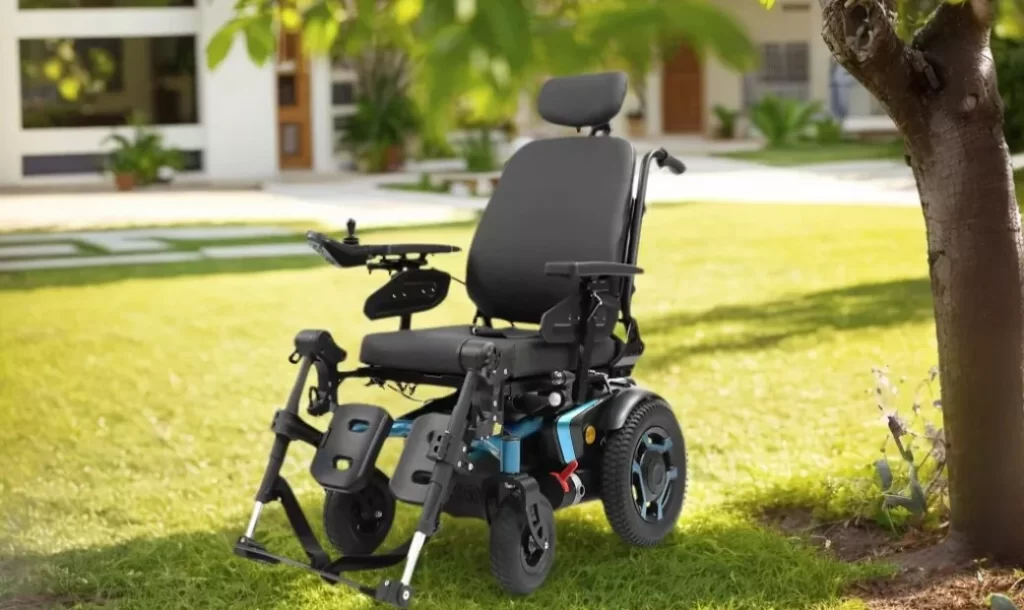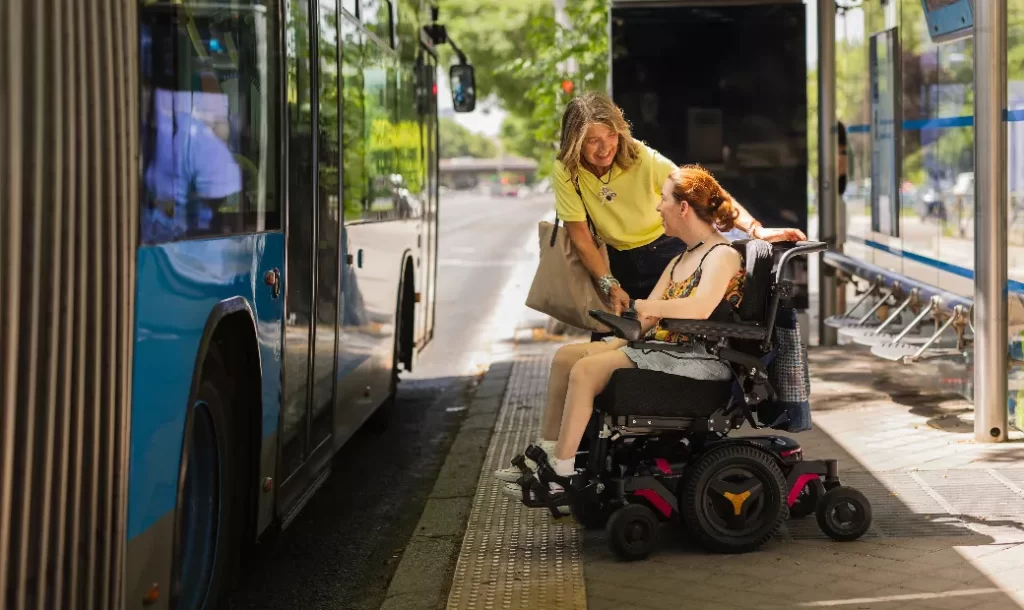Contact Us
Customizable Motorized Wheelchairs Allow Users to Personalize Speed & Comfort
2025-10-21
Introduction: The Growing Demand for Personalized Mobility
The mobility aid market is moving toward personalization and smarter technologies. Among all innovations, customizable motorized wheelchairs stand out for their ability to combine independence, comfort, and technology.
For hospitals, rehabilitation centers, and global distributors, offering adjustable electric wheelchairs is no longer optional—it’s a competitive necessity. These modern devices not only improve the user experience but also help institutions deliver more adaptable and efficient care.
Recent research published by the National Center for Biotechnology Information highlights that customization in wheelchairs directly improves user satisfaction and posture support, enhancing long-term mobility outcomes (More et al., 2025).

What Customization Means for Motorized Wheelchairs
Customization goes beyond aesthetics. It encompasses the mechanical, electronic, and ergonomic design of the wheelchair.
-
Adjustable speed and torque for different environments—indoor smooth floors or outdoor rough terrain.
-
Flexible control interfaces, including joystick, touchpad, or head control systems.
-
Ergonomic seating systems with adjustable backrests and seat depth.
-
Removable or pressure-relief cushions to prevent fatigue and sores.
According to Eclipse Care (2025), personalized wheelchair adjustments help users feel safer and more confident while navigating daily routines—something especially vital in long-term rehabilitation care.
Ergonomics: Redefining Comfort in Daily Use
Comfort is not just about padding; it’s about biomechanics. Poor posture can lead to muscle fatigue and spinal deformities. That’s why customizable wheelchairs now include ergonomic seating systems designed for long-term support.
Features such as tilt-in-space, recline, and lumbar adjustment allow each user to maintain proper alignment and pressure distribution.
MotionCares (2024) points out that personalized seating reduces the risk of pressure injuries and improves circulation—crucial for users who spend several hours daily in a wheelchair.
For institutional buyers, providing wheelchairs with multiple posture adjustments ensures a single model can serve diverse patient groups, reducing procurement complexity and long-term cost.

The Role of INTCO Medical in Personalized Mobility Solutions
As a globally recognized manufacturer of rehabilitation equipment, INTCO Medical develops motorized wheelchairs that balance innovation, comfort, and reliability.
The E-LITE electric wheelchair exemplifies lightweight luxury. Made from carbon fiber, it’s foldable and portable yet sturdy, offering customizable seat angles and detachable cushions.
The STAR wheelchair focuses on intelligent mobility, with multi-mode driving options, adjustable seating, and a responsive joystick control system. These features cater to both individual users and healthcare facilities seeking adaptable fleet solutions.
By providing OEM and ODM services, INTCO supports distributors and medical organizations worldwide with tailored configurations that match regional preferences and clinical standards.
Enhancing User Independence
Customization enhances not only comfort but also autonomy. When users can choose their control method, adjust their seat, and manage speed profiles, they gain confidence and freedom.
A study by Technologies Journal (Dzogbewu, 2024) found that patients using customized electric wheelchairs reported higher satisfaction and emotional well-being, attributing this to increased self-efficacy and mobility performance.
For B2B buyers, such outcomes translate into stronger product reputation and long-term value—making customizable models an attractive addition to rehabilitation programs, nursing facilities, and government procurement projects.
Durability, Efficiency, and Green Design
Beyond personalization, today’s electric wheelchairs are built with energy efficiency and sustainability in mind.
Manufacturers are adopting lightweight aluminum or carbon-fiber frames, lithium-ion batteries, and smart charging systems that extend range while reducing environmental impact.
INTCO’s approach, combining lightweight materials with efficient power management, ensures that the same wheelchair performs optimally across various terrains with minimal power consumption—important for organizations that value operational efficiency and long battery life.
Customization Benefits for Medical and Institutional Buyers
For hospitals and care centers, customization provides tangible operational benefits:
-
Adaptability: Adjustable speed, armrests, and seat angles allow the same wheelchair model to serve multiple patient needs.
-
Reduced maintenance: Properly tuned configurations minimize component stress, lowering repair frequency.
-
Standardized yet flexible fleets: Facilities can order the same base model but adjust configurations during use.
-
Brand consistency: Custom upholstery and colors allow organizations to maintain a unified appearance.
Overcoming Customization Challenges
The biggest challenges in adopting customizable motorized wheelchairs are cost, training, and maintenance. However, modular design and easy-to-swap parts are mitigating these barriers.
Manufacturers now offer plug-and-play systems, where motors, batteries, and joysticks can be replaced or upgraded without replacing the entire unit. This modularity appeals to B2B clients seeking longevity and simplified servicing.
Future developments may include AI-driven adaptation, where the wheelchair learns user preferences over time and automatically adjusts seat position, acceleration, and braking for comfort and safety.

Choosing the Right Supplier
When sourcing customizable motorized wheelchairs, buyers should evaluate:
-
Manufacturing certifications (ISO, CE, FDA)
-
After-sales service and spare parts availability
-
Customization depth (hardware and software)
-
OEM/ODM flexibility
With its integrated R&D, large-scale manufacturing, and international partnerships, INTCO Medical is well positioned to supply both institutional and retail buyers seeking custom-configurable, high-performance motorized wheelchairs.
Conclusion: Personalization Defines the Future of Mobility
As the rehabilitation equipment industry advances, customization will continue to define the future of mobility. Motorized wheelchairs are evolving from standard medical devices into personalized mobility systems—where comfort, independence, and efficiency converge.
For hospitals, distributors, and rehabilitation organizations, investing in customizable models ensures greater patient satisfaction, operational flexibility, and long-term reliability.
With innovators like INTCO Medical leading this transformation, the future of wheelchair mobility is one where every ride is optimized for speed, safety, and comfort—exactly the way users need it.
References
-
More, S., et al. (2025). Customization of manual wheelchair components: a state-of-the-art review. National Center for Biotechnology Information (NCBI). Retrieved from https://www.ncbi.nlm.nih.gov/pmc/articles/PMC11931783/
-
Dzogbewu, T. C. (2024). Adoption and use of customized wheelchairs: A technology acceptance study. Technologies, 9(1), 3. Retrieved from https://www.mdpi.com/2411-9660/9/1/3
-
Eclipse Care. (2025, June 30). Why custom wheelchairs improve comfort & mobility: A tailored approach to empowered living. Retrieved from https://eclipse.care/why-custom-wheelchairs-improve-comfort-and-mobility-a-tailored-approach-to-empowered-living/
-
Mobility Masters. (2024, July 10). How can I modify a motorized wheelchair for my individual needs? Retrieved from https://mobilitymasters.com/blog/how-can-i-modify-a-motorized-wheelchair-for-my-individual-needs/
-
MotionCares. (2024). Customized wheelchair seating – A fit for everyone’s unique needs. Retrieved from https://motioncares.ca/customized-wheelchair-seating-a-fit-for-everyones-unique-needs/


